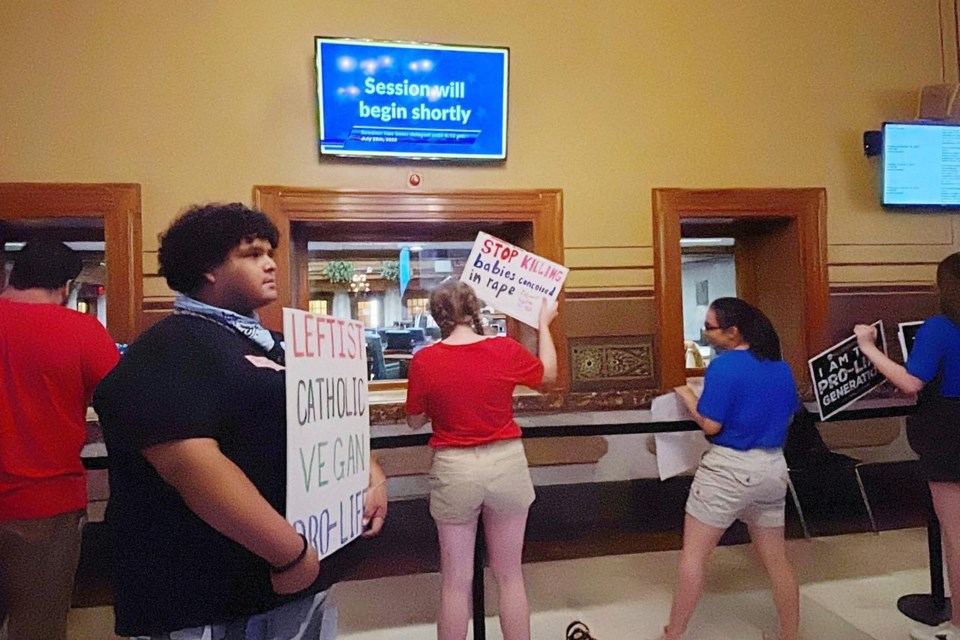INDIANAPOLIS (AP) — Indiana Republican legislators delayed the start of debate on a proposed abortion ban Thursday amid days of public division over how tightly the law should cover any exceptions for rape or incest victims.
The Republican-dominated state Senate was set to take up possibly dozens of possible amendments to the bill, but that debate was delayed by more than five hours before beginning as GOP senators met privately after having been split between those who those who support rape and incest exceptions and those who want to prohibit abortions except to protect the pregnant woman’s life.
Indiana has one of the first Republican-run state legislatures to debate tighter abortion laws since the U.S. Supreme Court last month overturned Roe v. Wade. Its debate comes as several states are also in the midst of court fights over whether tighter abortion restrictions can take effect.
The Indiana Republican disagreement over the abortion ban proposal contrasts with West Virginia, where the GOP-dominated House of Delegates voted Wednesday in favor of a sweeping abortion ban that includes exceptions for victims of rape and incest, as well as for medical emergencies.
The proposal first released last week by Indiana Senate Republican leaders would prohibit abortions from the time a fertilized egg implants in a uterus with limited exceptions, including a requirement that a woman or girl seeking an abortion because of rape or incest to sign an affidavit attesting to the attack.
Anti-abortion activists have roundly assailed the Indiana proposal as too lenient with its exceptions and lacking adequate enforcement measures.
A top legislative Republican, Senate Majority Leader Mark Messmer, voted against the measure during a committee meeting Tuesday, lamenting the “near impossibility of threading the perfect needle” on the issue during a short special legislative session that GOP Gov. Eric Holcomb originally called to address a tax rebate plan.
Holcomb has avoided saying whether he supported the proposed abortion ban and stayed out of public view during demonstrations Monday and Tuesday that drew thousands of competing anti-abortion and abortion-rights supporters to the Statehouse as a legislative hearing on the bill took place.
The Indiana proposal followed the political firestorm over a 10-year-old rape victim who traveled to the state from neighboring Ohio to end her pregnancy. The case of the Ohio girl gained wide attention when an Indianapolis doctor said the child had to go to Indiana because Ohio banned abortions at the first detectable “fetal heartbeat” after the Supreme Court’s abortion decision.
The bill cleared the committee on a 7-5 vote Tuesday with two Republicans saying they disliked the proposal as it stood and only voted to advance it in hopes of the full Senate making changes.
Senate Democratic Leader Greg Taylor said Wednesday it was clear Republicans had not reached an agreement on a bill to advance to the House for consideration.
“I think they’re having problems,” Taylor said. “I can’t speak to whether or not anything’s gonna pass.”
Republican Sen. Sue Glick of LaGrange, the abortion bill’s sponsor, said she was “not exactly” happy with the proposal after the committee adding provisions under which doctors could face felony criminal charges for performing an illegal abortion, along with limiting the time period allowing abortions in cases of rape and incest to eight weeks of pregnancy for women ages 16 or older and 12 weeks for those younger than 16.
Glick acknowledged this week that there was a chance Republicans wouldn’t be able to reach consensus before the special session’s Aug. 14 deadline to adjourn.
“If we can’t reach that result, there is a statute in Indiana we’ll live with until it will change in the future,” Glick said Monday. “If that decision can’t be made in a week or two weeks’ time, then we’ll come back in January and start again.”
__
Arleigh Rodgers is a corps member for the Associated Press/Report for America Statehouse News Initiative. Report for America is a nonprofit national service program that places journalists in local newsrooms to report on undercovered issues. Follow Rodgers on Twitter at https://twitter.com/arleighrodgers
Tom Davies And Arleigh Rodgers, The Associated Press



